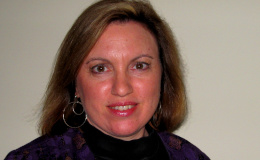Starting HPV vaccination at age 9 or 10 is preferable; vaccinating people older than 26 is not recommended
The American Cancer Society has updated its guideline for human papilloma virus (HPV) vaccination. New recommendations are for healthcare providers to routinely offer the HPV vaccine series to boys and girls between ages 9 and 12 (versus the previous 11 or 12).

“We’re seeing evidence that starting vaccination at age 9 or 10 has potential benefits that are expected to lead to higher vaccination rates, resulting in increased numbers of cancers prevented compared to starting at ages age 11 and 12,” said Debbie Saslow (pictured here), PhD, managing director, HPV & GYN Cancers and lead author of the 2020 ACS Guideline Update. “It’s for that reason we felt it was important to say that starting at age 9 or 10 is more than OK; it’s preferable to achieve the full cancer-preventing potential of this vaccine.”
For most children younger than 15, HPV vaccination is a series of 2 shots. Children who have weakened immune systems and those who get the first dose at age 15 and older need 3 shots. For any kids who haven’t completed the series, the ACS guideline recommends healthcare providers offer “catch-up” HPV vaccination up to age 26. The ACS does not recommend vaccination after age 26 because of its minimal effectiveness. There's also a global shortage of HPV vaccine that is expected to continue for the next several years.
The full updated guideline was published online today in CA: Cancer Journal for Clinicians, our flagship medical journal, along with an informational patient page.
If you would like to share this news, direct people to cancer.org.
Why HPV vaccination is important
Almost everyone who is not vaccinated will get HPV at some time in their lives, though most will never know it. The infection usually goes away on its own and doesn’t cause health problems. But in some cases, HPV doesn’t go away. Some types of HPV can cause genital warts, while other types can lead to cancer. The HPV vaccine helps prevent infection by both of these types of HPV.
Most HPV infections that lead to cancer can be prevented by vaccinating children and teens on time. HPV vaccination helps protect girls from cancers of the cervix, vagina, vulva, anus, and throat. For boys, it helps protect them from cancers of the penis, anus, and throat.
“The American Cancer Society has made preventing HPV-related cancers through vaccination one of our highest priorities,” said Debbie. “When we combine improved vaccination rates with the screening and treatment of precancers in the cervix, we have the potential to make history by eliminating cervical cancer.”
“The combination of HPV vaccination and cervical cancer screening has the potential to prevent tens of thousands of cancers caused by HPV each year in this country and to eliminate cervical cancer as a public health problem in the coming decades,” conclude the authors. “Vaccination of all children between ages 9 and 12 years will prevent >90% of the cervical, oropharyngeal, anal, vaginal, vulvar, and penile cancers that are caused by HPV and, combined with screening and the treatment of cervical precancers, can lead to the first elimination of a cancer in history.”
Helping more people get HPV vaccinations on time
These guideline changes were made to help more people get their HPV vaccinations when the vaccine is most effective and before they are exposed to the virus. “Research is starting to show that more parents agree to vaccination when it starts between ages 9 and 10. Younger children are also more likely to complete the series than those who start between ages 11 and 12,” said Debbie. Children who are vaccinated on time are also likely to have a stronger immune response.
History of the guideline
ACS first issued a guideline for routine use of the HPV vaccine in 2007, with an update issued in 2016. Until today, we recommended that routine HPV vaccination for girls and boys begin at age 11 or 12, but noted that that the vaccination series could start as early as age 9.
Today's update comes from ACS’s Guideline Development Group’s review and adaptation of the 2019 update from the Advisory Committee on Immunization Practices, the main source for U.S. immunization policy and part of the U.S. Centers for Disease Control and Prevention.
RECAP
Age to begin vaccination
- Girls and boys should get 2 doses of the HPV vaccine at ages 9 to 12 years.
Qualifying Statement: Routine HPV vaccination between ages 9-12 years is expected to achieve higher on-time vaccination rates, resulting in increased numbers of cancers prevented. Health care providers are encouraged to start offering the HPV vaccine at age 9 or 10 years.
Catch-up vaccination
- Teens and young adults up to age 26 years who have not received the HPV vaccine, or have not gotten all their doses, should get vaccinated, receiving 3 doses if the first shot was given at age 15 or older. Vaccination of young adults will not prevent as many cancers as vaccination of children and teens. Effectiveness decreases dramatically by age 18.
Qualifying Statement: Providers should inform individuals aged 22-26 that vaccination may be less effective in lowering their cancer risk.
Adult vaccination
- The ACS does not recommend HPV vaccination for persons older than 26 years.
Qualifying statement: ACS does not endorse shared clinical decision-making for adults ages 27-45 due to the low effectiveness and low cancer prevention potential of vaccination in this age group, the burden of decision-making on patients and clinicians, and the lack of sufficient guidance on selection of individuals who might benefit.
*Shared from MySocietySource.

No comments:
Post a Comment